Fabiano Caruana suffered a crushing defeat at the hands of Jan-Krzysztof Duda, who scored his first victory. With another draw, Ian Nepomniachtchi edges closer to winning the Candidates
Round 10 brought a major upset as Fabiano Caruana played poorly and was defeated by the young chess star from Poland. Caruana is still in second place but is now joined by Hikaru Nakamura and Ding Liren, who both won their games. All three have 5.5 points.
Tournament leader Ian Nepomniachtchi has edged further ahead. After a comfortable draw with Teimour Radjabov, he is now on 7/10. With four more games to play and a point and a half ahead of Caruana, Nakamura and Ding, Nepomniachtchi seems almost unstoppable.
In a very solid game in the Catalan, Ian Nepomniachtchi secured an edge against Teimour Radjabov, putting pressure on an isolated c4 pawn, potentially leading to a b-file runner for White. Nepomniachtchi opted to simplify things and brought the game to a draw. At no point was he in any serious trouble. Nepomniachtchi continues to play confidently – he is the only player in the Candidates without a loss and he is playing very solidly, edging closer to taking this event for a consecutive second time.

Hikaru Nakamura scored an important victory as White against Alireza Firouzja. In the Najdorf line of the Sicilian Firouzja, playing with black pieces introduced a dubious novelty: he captured on f6 with his g-pawn, leading to a weaker pawn structure and, ultimately, to his demise. The young French superstar, who finally won his first game in the previous round, completely broke in the duel with Nakamura. After choosing a path which got him into an inferior position, he then opted to open the centre weakening the light d5 square, which Nakamura used to take over control and then organize an attack on the black king to which Firouzja had no defence.
Just as it seemed that after the last round’s victory over Rapport, Firouzja’s creativity was finally ascending, he came down crashing. After the game, Nakamura said that he thinks Firouzja was under a lot of pressure and that it was a mistake for him to lose his momentum and stop playing for nine months in preparation for the Candidates. Nakamura, on the other hand, achieved a crucial victory as he is now in shared second place with Caruana and with Ding Liren.
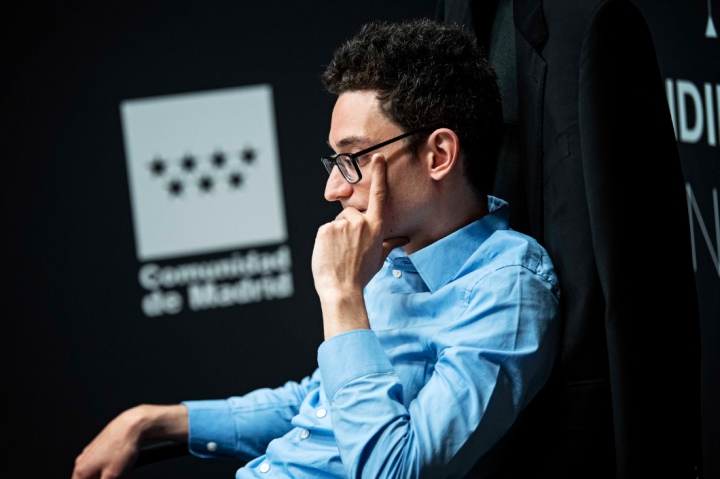
The biggest surprise of the day is Fabiano Caruana’s loss to Jan-Krzysztof Duda. His ambitions to stay in the race for the first place and catch up with Nepomniachtchi if he stumbles have now suffered a crushing blow.
Playing as White, Duda opted for the Italian Game – an opening Caruana is considered to be a leading expert in. From early on, Caruana was playing aggressively. He obviously thought that his best chances are against Duda, who entered round ten as the only player without a victory in the tournament so far. Caruana was overly optimistic: he overstretched himself on the kingside, organizing an attack on the white king, but – on the contrary – ended up creating more weaknesses in his own camp. As it turned out, not only was Duda’s king secure, but White ended up opening the g-file, and he was the one attacking the (black) king. Caruana was in a significantly worse position and desperately in time trouble, but this is where Duda stepped in. He couldn’t find the right path to victory and allowed Caruana breathing space. Still, Black’s position was so dire that even Duda’s unprecise play did not help him to get away. In the end, Caruana had to come to terms with the inevitable and admit defeat.
A shocking loss by Caruana (which now throws his ambitions completely off balance) and an important victory for Duda, who needed his confidence lifted, having suffered three defeats in the previous four rounds.

Richard Rapport finally lost steam as he suffered a second loss in a row. In the Ruy Lopez a very sharp position developed on the board. Ding managed to get out of the opening as slightly better but his uncastled king was a potential weakness. Rapport gave up a pawn on the queenside in an attempt to open the position and get to Black’s king. True to his aggressive style, Rapport did not hesitate to sacrifice a knight to complicate matters even more, but he was first to buckle under pressure. The opponents ended up in an endgame substantially better for Black despite being down an exchange. Ding demonstrated good technique and scored a full point. Rapport is down, while Ding – after a slow start, has now stepped further up, sharing second place.
Here follows a closer look at the games from round ten of the Candidates.
Richard Rapport vs Ding Liren: Fire vs fire
It was a sharp game where two players did not shy from trying their luck.
In the Ruy Lopez with 4.d3, Rapport avoided the main lines, and by move 12, the opponents stepped into uncharted territory. Ding aggressively advanced his pawns on the kingside, but his king remained in the centre which suggested a very sharp play.
Rapport pushed on the queenside with 16.b4 and 17.Bb3, centralized his light-squared bishop and then offered a very interesting pawn sacrifice to engineer some activity on the kingside.
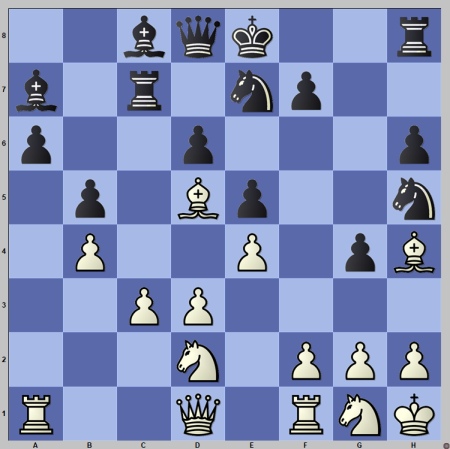
Ding grabbed the pawn – 21…Rxc3 and proceeded to consolidate his position. Still with his king in the centre, Black could not feel safe. White opened the f-file maintaining pressure but without real threats in sight.
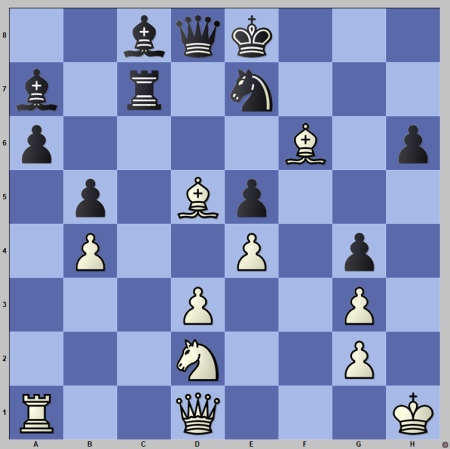
28…Qd6 29.Qf1 was played and here Ding made an inaccuracy – 29…Bd4, and after 30.Bf7+! it was even.
In the subsequent complications, Rapport added some fuel to the fire on the board, with an impressive knight sacrifice.
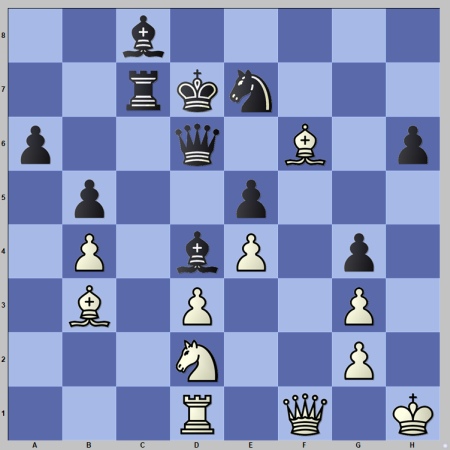
Rapport bravely played 33.Nc4!? Although computers recommend 33.Ba2 and 33.Bf7, Rapport deserves full credit for his panache. The position was very sharp and Rapport went for the black king. However, he was the first to buckle under pressure.
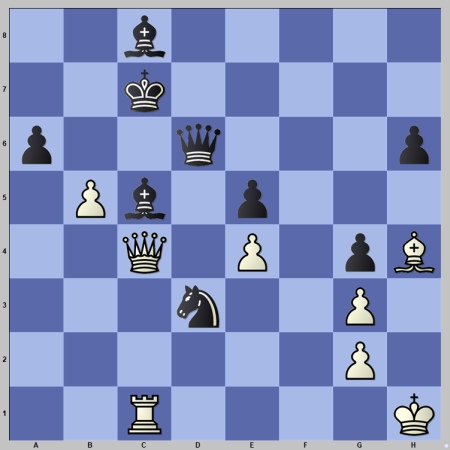
Rapport played a natural but wrong move 42.Rc3 (much better was 42.Be7 with a roughly equal position), but after 42…axb5! 43.Qxd3 Rxd3 44.Rxd3 Bd4! Black got a much better endgame.
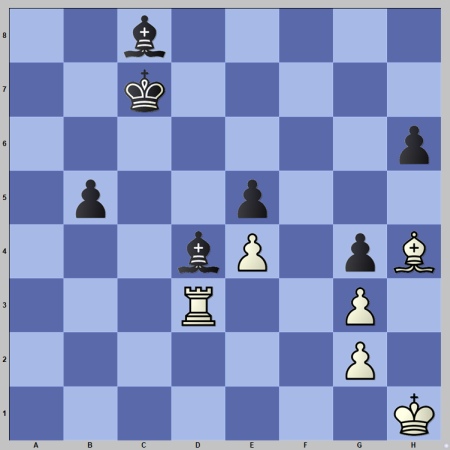
White’s king is out of play, while Black’s b-passer is extremely dangerous.
Rapport returned the exchange and tried his luck in the ending with opposite-coloured bishops, but there was no hope. Ding converted his advantage with surgical precision and scored his second victory in the event, which brought him to a shared 2-4th place.

Jan-Krzysztof Duda vs Fabiano Caruana: A big victory and a big defeat
Despite playing as black, Caruana was the favourite for this game. After all, he’s in second place trying to catch the leader, and he won this event once before. Duda, a novice to the Candidates, wasn’t having a great time, having suffered three defeats in four previous games. However…
The Italian Game was played – an opening Caruana holds one of his PhDs on chess theory in.
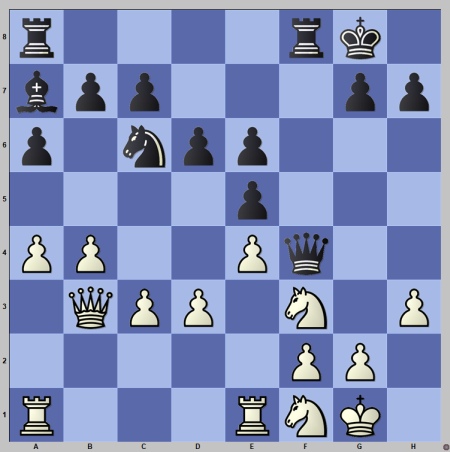
White was aiming to exert pressure on the queenside with b5. Black, on the other hand, somewhat optimistically played 15…Rf6 and launched an onslaught on the kingside. This move, however, was an ominous sign of things to come.
It gave a significant advantage to White. Black seems to have overestimated his chances on the kingside, while at the same time underestimating White’s pressure on the queenside. Caruana continued with his plan, with the g-pawn advanced, the queen leading the rook supporting the attack, while the a7-bishop was pinning the f2 pawn from a distance.
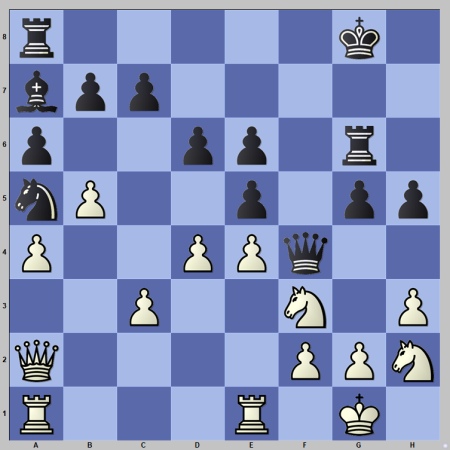
Caruana was very aggressive but dangerously exposed himself with his minor pieces stuck on the queenside. Duda responded calmly and confidently – pushing away black’s queen and aiming to release the pawns to secure a stronghold for his knights on the kingside. There was one more factor – time. Caruana was spending it much faster than his opponent.
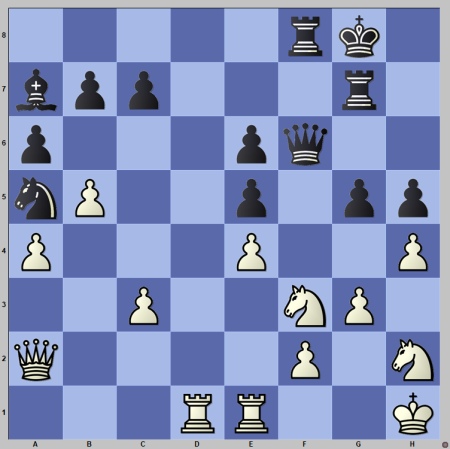
With 24.h4 White struck Black where he thought he was strongest – directly going for the clearing of the g-file and opening Caruana’s king for an attack down the same line.
Black had weaknesses all over the board. Duda was now organizing an attack on the black king – he aligned his rooks on the g-file and was dominating.
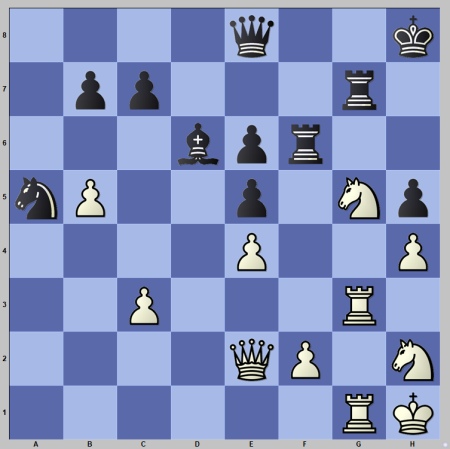
Here Duda made a mistake. Instead of R3g2 or c4, he played 32.Qf1, giving a chance to Caruana. In the following moves, Duda started wavering, giving more opportunities to Black to ease the pressure, including allowing Caruana to bring his a5-knight to life.
It is evident that Duda wasn’t happy with the way he played after move 31. The good thing was that his position was so dominant that he had space for the errors he made.
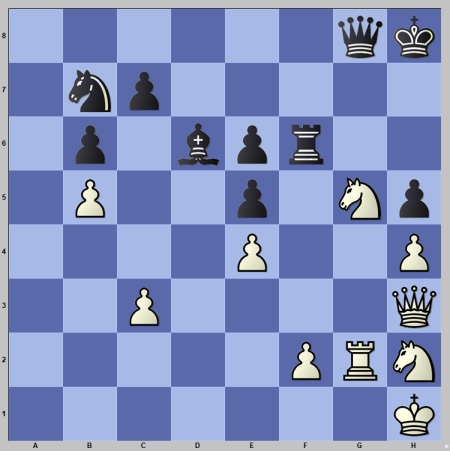
After missing some good opportunities, Duda found the strongest one in this position, 39.f4! Caruana quickly played 39…Nc5 and after 40.fxe5 Bxe5 41.Nf3! survived the first time control, but he was now a piece down.
Like in the game against Nakamura, Caruana continued to fight despite being in a lost position. As the saying goes, you can’t save a game you resigned. Duda’s conversion was not optimal, but Black’s position was so hopeless that nothing helped.

After a fierce and long battle, Caruana had to give up. A devastating blow to his ambitions in the tournament and the first victory for Duda.
Ian Nepomniachtchi vs Teimour Radjabov: Unchallenged solidity
In a popular variation of the Catalan, both sides quickly castled short and proceeded to play on the queenside. It was a line Nepomniachtchi was familiar with as Black, having prepared it for the match against Carlsen.
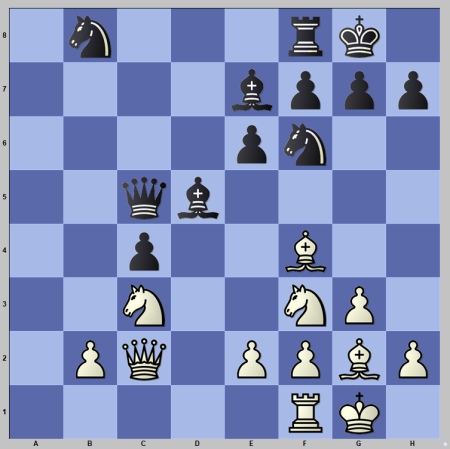
In this position White introduced a logical novelty 16.Be3, which gave him a small edge: his pieces were developed and well placed and he was attacking the c4 pawn which was difficult for Black to defend.
Radjabov opted to give up his white-squared bishop, which left Nepomniachtchi with two bishops and more initiative, although there was no clear way to turn it into something tangible. Maybe Nepomiachtchi missed a couple of stronger moves here and there but it is hard to point out a clear way to a sizable advantage.
Eventually, White decided to simplify and go for a draw. The b2 and c4 pawns were traded-off, the opponents exchanged several pieces and steered into a dead-even endgame with opposite-coloured bishops.
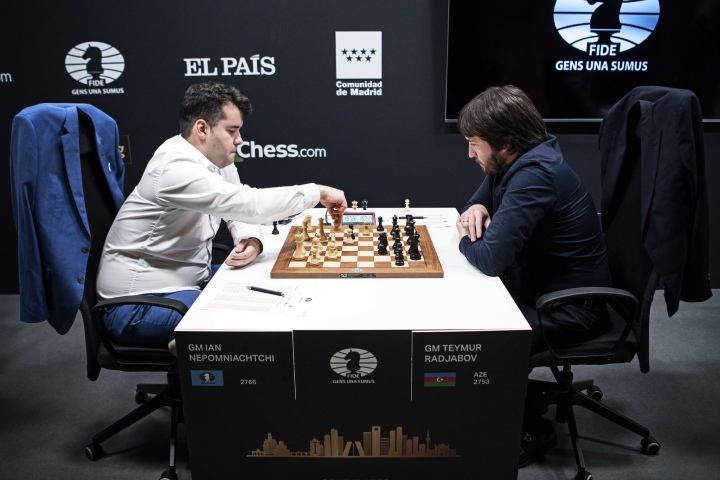
After two and a half hours of play, Nepomniachtchi and Radjabov agreed on a draw.
By the point this draw was agreed, Nepomniachtchi – who spends a lot of time walking around during the rounds – knew that Caruana was in trouble against Duda, which probably made his decision to draw even easier. On plus four, Nepomniachtchi is confidently moving forward.
In the after-game commentary, Nepomniachtchi said that he expected this line to occur today. ‘I was trying to pull something out of the opening, and it seemed to me that I did’. Assessing the tournament so far, Nepo said: ‘Despite the score, still very much is left behind the curtains’.
Hikaru Nakamura vs Alireza Firouzja: Setting up to fail
This game promised a fierce battle. The two sharp and creative players in an event like the Candidates – what else to expect? However, one of them disappointed.
Firouzja opened with a Sicilian. He opted for the Najdorf – one of the sharpest variations. It was a thinking battle from early on. After nine minutes of thinking, Firouzja played a rare move 7…Nc6 (instead of the more common 7…Be7).
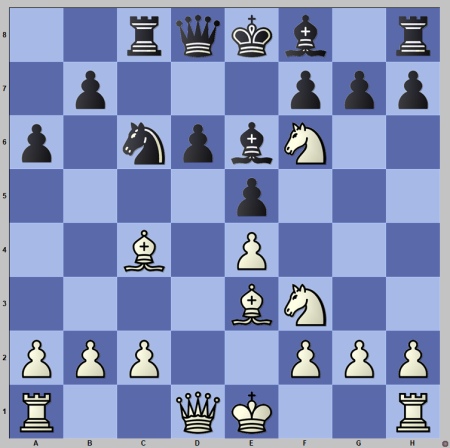
Instead of 10…Qxf6, which is more common and looks natural, Fioruzja decided to take 10…gxf6, wrecking his structure but stating that he is up for a sharp game. This decision will come to haunt him later in the game.
After the exchange of light-squared bishops, Firouzja pushed in the centre with d5, offering an exchange of queens. Nakamura refused the trade, opting to activate his rook, and after dubious 15…Nf5 by Firouzja, White grabbed the initiative.
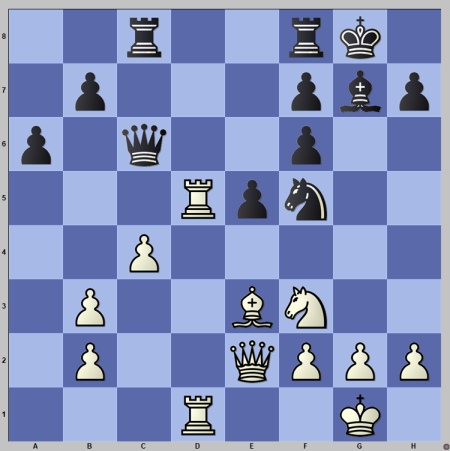
Dominating in the centre, White is clearly better here, while Black has made no advance on the kingside with his pawns and created no threat to the white king.
Firouzja responded by trying to make an advance on the queenside, but he missed an opportunity. Following 18…Rfe8 19.h3 b5, White responded with 20.c5, giving a chance to Firouzja to play a5. Instead, Black opted for 20…Bf8 and after 21.b4 Firouzja went for an exchange which wrecked his position completely.
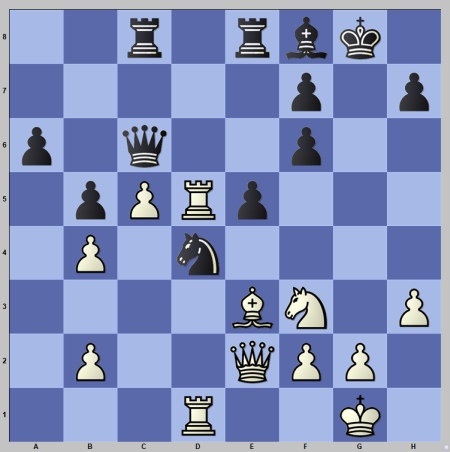
After 23.Nxd4 Qd4 24.Nf5 White was now starting to knit a mating web around the black king. ‘I didn’t calculate all of this, but I just knew it was right, said Nakamura after the game. He proceeded to bring his rook into attack via Ra1-a3.
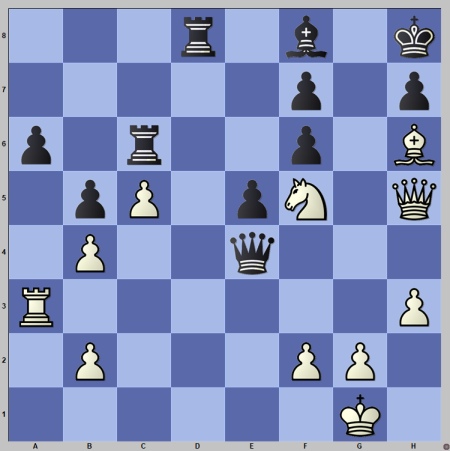
In this position, on move 28, Firouzja had less than a minute on his clock! He was completely lost. He took with the queen on b4 and after that White had a clear path to checkmate. On move 32 Firouzja resigned.
An important victory for Nakamura and a disappointing loss by Firouzja who didn’t get to show much in the game.
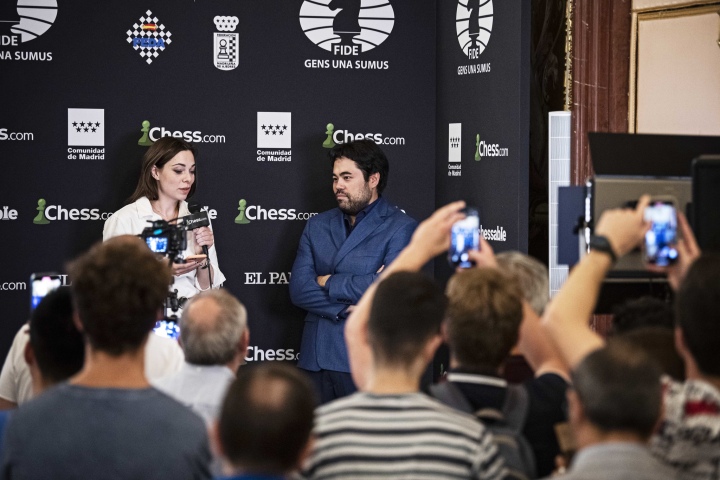
Round eleven of the Candidates starts on Thursday the 30th of June at 3 PM CEST at the Palacio de Santona in Madrid.
The pairings of round eleven are as follows:
Hikaru Nakamura vs Richard Rapport
Alireza Firouzja vs Ian Nepomniachtchi
Teimour Radjabov vs Jan-Krzysztof Duda
Fabiano Caruana vs Ding Liren
For more information please visit: https://candidates.fide.com/
Text: Milan Dinic
Photos: FIDE / Stev Bonhage
2022 Candidates Tournament Partners:

